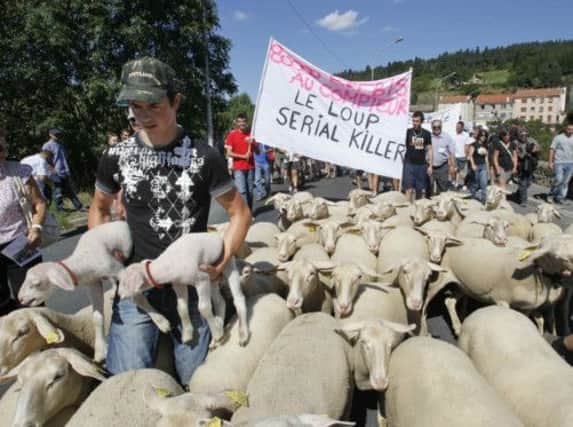France: Farmers anger over Wolves killing sheep


With official encouragement, herders and farmers had hunted the grey wolf to extinction in France by the 1930s. Within 50 years, though, the animal had been made a protected species throughout Europe; the first wolves re-entered French territory from Italy in 1992 – a small population, but much to the thrill of conservationists and European officials, they have thrived.
But to the exasperation of the region’s shepherds, the wolves’ success has been due in no small part to the ample, easy pickings. They have been slaughtering vast numbers of sheep – at least 20,000 in just the past five years, according to the latest official count. The government has spent tens of millions of euros in efforts to limit the attacks, but to little avail, and shepherds increasingly call the wolf an existential threat.
Advertisement
Hide AdAdvertisement
Hide Ad“They’re killing shepherding as I know it,” said Bernard Bruno, 47, who has lost at least 1,000 sheep. The wolf’s return may symbolise environmental progress to some, said Bruno, who has spent 25 summers alone here with his flock and a walking stick. But it has also imperilled “one of the last natural, ecological kinds of livestock farming”, he said.
Bruno’s pastoral approach – one still practiced by 60,000 French herders – is indeed supported by environmentalists, the government and the European Union as a model of sustainable agriculture and is heavily subsidised as a result. Nonetheless, the average shepherd earns the equivalent of the French minimum wage. It is a hard living made harder by the wolf.
“If you ask me, when they talk about ‘environmentalism’ today, it’s meant for city people,” Bruno said. “You go talk about the bear, the wolf, about nature that’s a bit wild, and you send them all off dreaming.
“Come ask us, the shepherds, about putting sharks in the Mediterranean,” he added. “You’ll get 99 per cent in favour. I don’t go swimming, I don’t give a damn!”
France’s wolf population is hardly Europe’s largest, at about 250, but it is the most contentious. Many of the country’s most rugged expanses – habitats suited to the wolf – are farmed.
“We’re not in a big country,” said Serge Préveraud, president of the National Ovine Federation. France’s six million sheep, Mr Préveraud said, cannot reasonably be expected to “cohabit” with wolves.
The EU considers the wolf’s return to northern and western Europe a “success story of the last 40 or 50 years”, said Joe Hennon, the spokesman for the Commissioner for the Environment. Still, he said, the wolf’s impact on livestock was becoming an issue.
French authorities spend millions to reimburse herders for lost animals and to subsidise the great Pyrenees guard dogs that pad alongside many flocks. Despite an outcry from conservation groups, they have organised the shooting – “sampling”, in official parlance – of a handful of wolves. Nothing seems to have worked, though; sheep and goat losses doubled over the past five years to nearly 6,000 in 2012.
Advertisement
Hide AdAdvertisement
Hide AdUp to 24 shootings will be authorised this year under an updated wolf plan, but only one wolf has been killed thus far. The population is believed to be growing by about 20 per cent each year.
Financial strain aside, the wolf has transformed the quiet rituals of herding in ways that are exhausting, shepherds say.
“We have to be there, guarding them constantly; that’s what’s become infernal – we’re there day and night,” said Bruno, whose 11 guard dogs could not save the 180 sheep he lost last year.